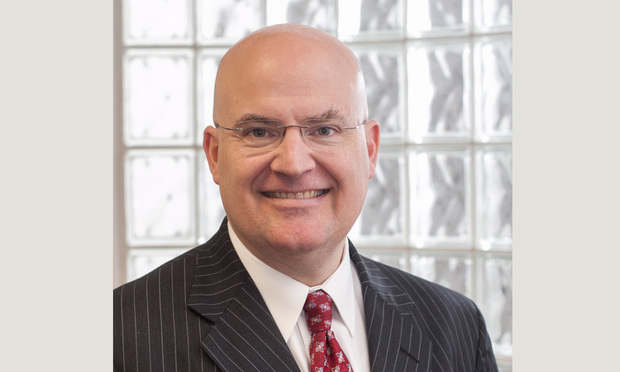Atlanta Pays $935K to Ex-Crime Lab Chief Fired for Testifying for Florida Defendant
Donald Mikko was fired after Fulton County District Attorney Paul Howard Jr. complained to Atlanta's Police brass that the crime lab director was going to testify on behalf of a criminal defendant in Florida.
November 01, 2019 at 04:12 PM
4 minute read
 Matthew C. Billips, with Orr, Brown & Billips. (Courtesy photo)
Matthew C. Billips, with Orr, Brown & Billips. (Courtesy photo)
The city of Atlanta has agreed to pay $935,000 after firing its former crime lab chief for testifying as a defense expert in a Florida criminal case.
Donald Mikko was booted from his job after Fulton County District Attorney Paul Howard Jr. complained to former Atlanta Police Chief George Turner that, as a police official, Mikko should not be assisting criminal defendants even in another state, although his contract allowed him to do so.
Mikko sued APD, Turner, Howard and senior Fulton ADA Sheila Ross, who had been contacted by a Florida prosecutor about Mikko's upcoming testimony and was provided with a report Mikko had prepared.
Ross was accused of telling an APD major that Mikko's report "bad-mouthed Florida law enforcement," and that Howard had said "it does not look good for Atlanta police people, especially the crime lab director, to testify against the prosecution."
Mikko's complaint, filed in Fulton County, included claims for retaliation in violation of his free speech rights under the state and federal constitutions, racketeering and obstructing justice by conspiring to interfere with a witness' testimony in a criminal trial.
The case was removed to the U.S. District Court for the Northern District of Georgia, where Judge Leigh May dismissed the state claims against Howard and Ross but allowed the federal constitutional claims to survive.
The prosecutors appealed, arguing that they were protected by prosecutorial and qualified immunity.
The U.S. Court of Appeals for the Eleventh Circuit declared in 2017 that they were not shielded by prosecutorial immunity "based on actions taken by prosecutors to prevent a witness from testifying in a case handled by a different prosecutor, from a different office, in a different jurisdiction."
But the appeals court said the prosecutors were protected by qualified immunity because, at the time they sought Mikko's ouster in 2013, there was no clearly established legal precedent that their actions violated his First Amendment rights.
Howard and Ross were dismissed from the suit, and Turner was dismissed earlier this year after arguing he was also protected by qualified immunity for the same reasons cited by the Eleventh Circuit. That left only the city as a defendant.
May also dismissed the racketeering claims.
Mikko moved for summary judgment on the constitutional claim, and his lawyer Matthew Billips said Turner provided key testimony in a deposition.
"I asked two questions," said Billips. "First, I asked, 'Is it true the reason you fired Mr. Mikko was because he testified for a criminal defendant in Florida?' And he said 'yes.'"
"Then I asked, 'If, all other circumstances being the same, Mr. Mikko had testified for the state, would you have fired him?' And he said 'no,'" Billips said.
That was a clear First Amendment violation, Billips said.
"Because of those questions and answers, we won summary judgment on liability, and the only issue left was damages," said Billips, who handled the case with Orr, Brown & Billips colleague Kristine Brown.
During a mediation before U.S. Magistrate Judge Alan Baverman, Billips said the judge "got the city way up from where they started," but the case was moving ahead toward trial when the defense team, headed by Department of Law attorneys Robert Godfrey and Duane Pritchett, agreed to settle.
The Atlanta City Council voted on Oct. 7 to approve paying Mikko $935,000 to settle the case.
"We're still waiting for the check," Billips said.
A spokesman for the city did not immediately reply to a request for comment Friday.
Billips noted that Mikko's was the second case he's handled against APD for retaliating against an employee who testified for a criminal defendant. In 2008, he sued on behalf of an officer who testified as a character witness on behalf of his brother-in-law and was hit with a 30-day suspension and demoted from senior patrol officer to patrol officer.
That case settled for $190,000, Billips said.
This content has been archived. It is available through our partners, LexisNexis® and Bloomberg Law.
To view this content, please continue to their sites.
Not a Lexis Subscriber?
Subscribe Now
Not a Bloomberg Law Subscriber?
Subscribe Now
NOT FOR REPRINT
© 2025 ALM Global, LLC, All Rights Reserved. Request academic re-use from www.copyright.com. All other uses, submit a request to [email protected]. For more information visit Asset & Logo Licensing.
You Might Like
View All
Transgender Care Fight Targets More Adults as Georgia, Other States Weigh Laws

Georgia Republicans Push to Limit Lawsuits. But Would That Keep Insurance Rates From Rising?
5 minute read
A Plan Is Brewing to Limit Big-Dollar Suits in Georgia—and Lawyers Have Mixed Feelings
10 minute readTrending Stories
- 1DC Circuit Keeps Docs in Judge Newman's Misconduct Proceedings Sealed
- 2Litigators of the Week: US Soccer and MLS Fend Off Claims They Conspired to Scuttle Rival League’s Prospect
- 3Litigator of the Week Runners-Up and Shout-Outs
- 4U.S.- China Trade War: Lawyers and Clients Left 'Relying on the Governments to Sort This Out'
- 5Willkie Adds Five-Lawyer Team From Quinn Emanuel in Germany
Who Got The Work
J. Brugh Lower of Gibbons has entered an appearance for industrial equipment supplier Devco Corporation in a pending trademark infringement lawsuit. The suit, accusing the defendant of selling knock-off Graco products, was filed Dec. 18 in New Jersey District Court by Rivkin Radler on behalf of Graco Inc. and Graco Minnesota. The case, assigned to U.S. District Judge Zahid N. Quraishi, is 3:24-cv-11294, Graco Inc. et al v. Devco Corporation.
Who Got The Work
Rebecca Maller-Stein and Kent A. Yalowitz of Arnold & Porter Kaye Scholer have entered their appearances for Hanaco Venture Capital and its executives, Lior Prosor and David Frankel, in a pending securities lawsuit. The action, filed on Dec. 24 in New York Southern District Court by Zell, Aron & Co. on behalf of Goldeneye Advisors, accuses the defendants of negligently and fraudulently managing the plaintiff's $1 million investment. The case, assigned to U.S. District Judge Vernon S. Broderick, is 1:24-cv-09918, Goldeneye Advisors, LLC v. Hanaco Venture Capital, Ltd. et al.
Who Got The Work
Attorneys from A&O Shearman has stepped in as defense counsel for Toronto-Dominion Bank and other defendants in a pending securities class action. The suit, filed Dec. 11 in New York Southern District Court by Bleichmar Fonti & Auld, accuses the defendants of concealing the bank's 'pervasive' deficiencies in regards to its compliance with the Bank Secrecy Act and the quality of its anti-money laundering controls. The case, assigned to U.S. District Judge Arun Subramanian, is 1:24-cv-09445, Gonzalez v. The Toronto-Dominion Bank et al.
Who Got The Work
Crown Castle International, a Pennsylvania company providing shared communications infrastructure, has turned to Luke D. Wolf of Gordon Rees Scully Mansukhani to fend off a pending breach-of-contract lawsuit. The court action, filed Nov. 25 in Michigan Eastern District Court by Hooper Hathaway PC on behalf of The Town Residences LLC, accuses Crown Castle of failing to transfer approximately $30,000 in utility payments from T-Mobile in breach of a roof-top lease and assignment agreement. The case, assigned to U.S. District Judge Susan K. Declercq, is 2:24-cv-13131, The Town Residences LLC v. T-Mobile US, Inc. et al.
Who Got The Work
Wilfred P. Coronato and Daniel M. Schwartz of McCarter & English have stepped in as defense counsel to Electrolux Home Products Inc. in a pending product liability lawsuit. The court action, filed Nov. 26 in New York Eastern District Court by Poulos Lopiccolo PC and Nagel Rice LLP on behalf of David Stern, alleges that the defendant's refrigerators’ drawers and shelving repeatedly break and fall apart within months after purchase. The case, assigned to U.S. District Judge Joan M. Azrack, is 2:24-cv-08204, Stern v. Electrolux Home Products, Inc.
Featured Firms
Law Offices of Gary Martin Hays & Associates, P.C.
(470) 294-1674
Law Offices of Mark E. Salomone
(857) 444-6468
Smith & Hassler
(713) 739-1250







